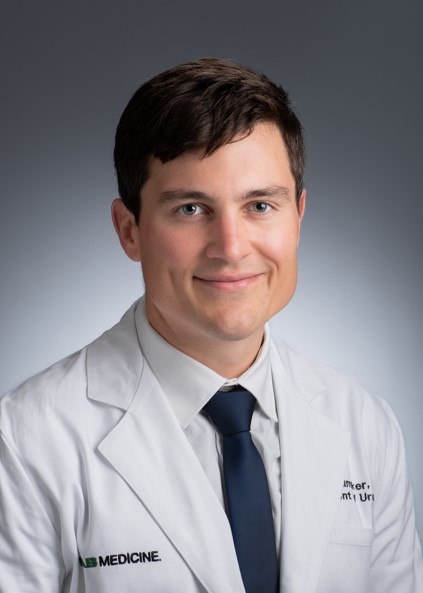Luke Shumaker, M.D., joined the Department of Urology as an assistant professor of reconstructive urology in September 2025. He completed his undergraduate degree in medicinal chemistry and molecular pharmacology at Purdue University. He then completed medical school at Indiana University before his residency training at UAB. He went on to complete a fellowship in abdominal urologic reconstruction at Temple University in Philadelphia.
Learn more about his journey and what inspires his work.

Can you share your professional background and experiences prior to joining our institution?
Shumaker: I completed residency at UAB, so my professional life prior to UAB was short. I had never been to the state of Alabama prior to interviewing for residency here. When my wife and I first moved, we did not plan to stay longer than my training. However, we really liked Birmingham and plan to live here for the foreseeable future now.
What inspired you to pursue a career in this field?
Shumaker: I liked the technical aspects of urology and found that I fit in with the surgeon personalities that found their way to urology (laid back – at least for surgeons).
What aspects of your new role here are you most excited about?
Shumaker: I trained at UAB for residency, so I knew the team here was excellent, but I am very excited to contribute to the UAB Department of Urology in my new role as faculty. I look forward to being very clinically busy but also exploring opportunities to teach and advance the field of urologic reconstruction. UAB has so many opportunities beyond clinical work, and I am excited to be involved in multidisciplinary research.
What is your primary area of expertise within your field, and what sparked your passion for it?
Shumaker: Abdominal reconstruction including bladder neck / posterior urethral reconstruction, ureteroplasty (fixing the tubes that drain the kidneys), benign cystectomy, and urinary diversions are my highest volume procedures.
Abdominal urologic reconstruction is amazing. Minimally invasive surgeries (one small incision, or three to five very small incisions) allow for the completion of complex surgeries that prevent patients from needing artificial tubes for the rest of their lives. I find the tangible nature of removing a tube after a successful reconstruction to be very rewarding.
What are your goals for making an impact through both your teaching and patient care in this role?
Shumaker: I want to provide access to excellent abdominal reconstruction techniques for patients in the state of Alabama. I hope to share basic abdominal reconstruction techniques with urology trainees at UAB so they can apply these techniques in their future practices. I also hope to aid in moving the field of urologic reconstruction forward. There are gaps in the field’s understanding regarding how ureters heal, how ureters respond to ureteral stents, and what factors lead to repeat scarring. I hope to be involved in answering some of these questions.